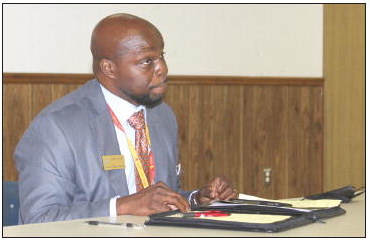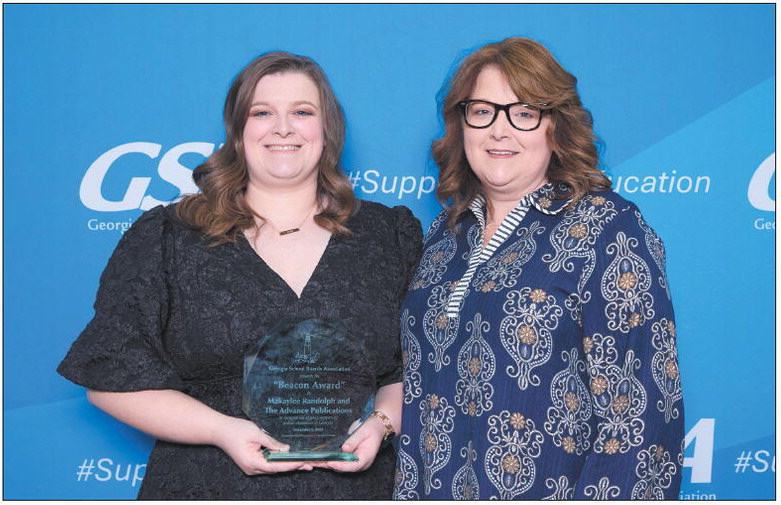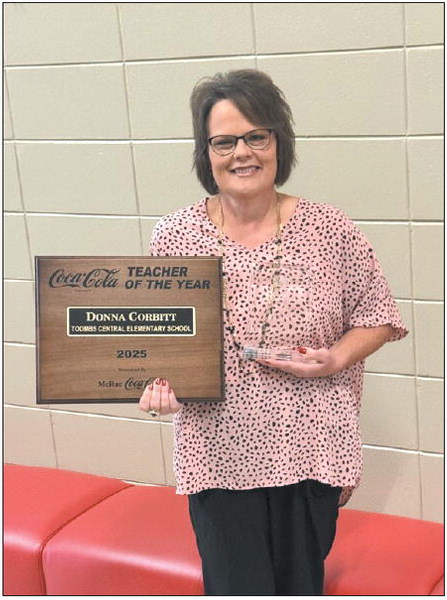Senator Warnock’s Rep Meets With Community Leaders


By Deborah Clark Regional Editor dclarkadvance@gmail.com
A representative from the office U.S. Sen. Raphael Warnock, D-GA, visited several area counties last week to hear straight from community leaders about issues and priorities.
“The Senator
Young
9A continued from page
wants to know how he can lend support,” said Andrew “Drew” Young II, field representative for Senator Warnock. Young met with Montgomery County citizens in Mount Vernon Thursday morning before coming to Alamo. Wheeler County was the 32nd county he visited out of the 51 he serves as a staff member for the Senator. “Your needs and concerns are important, and we plan for someone from the senator’s office to visit every county in Georgia by October,” Young said.
Among those attending the Wheeler County session were representatives of local government, education, law enforcement, the legal system, the local Chamber of Commerce, and social services.
Young outlined Senator Warnock’s top priorities for funding as housing, the needs of rural Georgia, literacy and education, as well as putting more focus on supporting and empowering children.
Wheeler County, with a population of about 7,000, is largely rural and has been consistently listed among the state’s most impoverished counties. Its biggest employers are a private prison, the school system and the logging industry. The county’s privately-owned hospital closed in 2013 and, although there is a medical clinic in Alamo, the nearest emergency facilities are approximately 30 minutes away in any direction. The county has been experiencing a decline in the general population over the last two decades and industrial prospects are at a standstill.
Among the issues and concerns voiced by community leaders in the session Thursday with Young were lack of county-wide broadband service and inadequate cell phone service which hamper the community’s ability to attract industry or new residents who may want to work remotely; lack of a hospital or emergency care within close proximity; lack of higher education within close proximity; lack of a transportation system which impacts health care and higher education connections; lack of a grocery store within the entire county; and stagnation in industrial development and overall community prosperity.
Young said that while rural Georgia is facing a broad range of issues, in every single session he has conducted, the lack of broadband services is “a big truth.” He said that “everybody from the governor down knows this is a big issue and there is funding in the system to address this issue across Georgia.” He added, “Anybody not figuring out how to make it work is kind of behind the eight ball. There is funding and momentum. We realize this not a luxury, it is essential and it will happen. The question is, will you be on the front end or back end?” He pointed out that a number of electrical membership corporations have already partnered with broadband providers, referencing Alma and its recent deal with the Altamaha Electrical Membership Corporation. He pointed out that the focus is now on the area of the state south of Macon. He noted, “I encourage anyone to not let yesterday define what you are going to do tomorrow. Eventually, everybody will have it and long-term it will be profitable. It is cheaper to do it now when it’s competitive than down the road. I encourage community leaders to start having that conversation.”
Alamo City Council member Patricia Woodward advised Young of the city’s need to rejuvenate overall and to build a new city hall. She referenced the lack of a big tax base and the quest to locate resources to accommodate the projects needed within the city. Young noted that building a City Hall is usually a locally-funded effort, but securing grants may depend on the building’s use. For instance, if the new City Hall is a municipal complex with emergency rescue, fire, and police under its roof, the project might qualify for funding from sources like Homeland Security and FEMA. Other funding for community projects may come from sources like a Community Development Block Grant available through the Department of Community Affairs; the Department of Housing and Urban Development; and the Department of Health and Human Services. Tri –County Connection Director Kristy Bennett said she has been advocating for a four-day-a week after school program in Wheeler County for several years. One concept for addressing this need is to use the county’s present elementary school in Alamo as an after school program site. The current elementary school will be vacated once the county’s new school opens (projected 2022) and the elementary classes are incorporated into the new building. Young said, “In general when it comes to youth programs and funding, it is easier to fund programs than buildings. If you have an existing facility, it is easier to staff programs.” Young suggested applying for a CDBG grant. “This is a state-managed program that is federally funding. The federal dollars are already allocated to the state.” He noted that certain cities with bigger populations cannot compete for these funds, which “makes the pot larger.” Young added, “If it (an After School program) proves to be something that is federally fundable for this county, I would strongly suggest it be a conversation between any groups that work with children and make it an application that benefits the whole county. It could be a program that also creates wrap-around services like transportation, meals, and broadband.” He suggested that Family Connections is an ideal organization to spearhead that project. “Family Connections can also bring in private funding, ” he advised.
Wheeler County Commissioner Rochelle Culver asked for assistance in sorting out the use of current CARES funds. “I have a list of 12 items we might be able to use this money for, but everything is so general. It needs to be narrowed down,” she said of determining federal guidelines for how the funds are applied. Young responded, “The issue of clarity in how CARES funding is used is a recurring request.” He promised that clarifying documents will be disseminated as soon as they become available.
Commissioner Culver also brought up the issue of the county’s lack of a hospital or emergency medical care closer than 30 minutes away. She pointed out, “Too many people do not have transportation. They cannot afford to go to Dublin or Vidalia or Eastman.”
Young said that having a hospital in any one small community is very difficult, but there might be a solution if contiguous rural counties work together. “Instead of considering this a Wheeler issue, think of it as an issue for several counties. There should be some type of facility which is reasonably accessible to sick people no matter where you live.” He said he would carry this matter to the Senator as an official ask so that this area might be able to get some assistance and direction in resolving its health care dilemma. Councilwoman Woodward, who noted that she moved to her husband’s hometown of Alamo from Atlanta, said the small community has a lot of amenities. “We have a lot of cohesiveness. We are close knit. We don’t need to depend on government to do the things we can do for ourselves. I am OK with that. We need to be of one accord.” Young responded, “One of the great advantages of living in a community like this is that you literally can know everybody. You can have major kitchen table conversations that better the whole county. You can have brain-storming sessions that result in small group assignments. You can do a lot with just a few small groups of people working on projects.” He suggested hiring independent researchers and grant writers to help develop master plans and find grant resources, and whose salaries could be a percentage of the grants they secure. “Or make a commitment to do it on your own. It’s within your reach, but someone has to be proactive, “ he said.
He noted that all federal grants must have a communication component. “Nothing is hidden. This information can be found.” He advocated applying for grants to start momentum. “You may not get every grant, but if you have your name in the pools of agencies like HHS, HUD, FEMA, they start to pay attention. You will create momentum around getting your projects funded. You will get eyes on you for things you didn’t even know you qualified for.” He added, “Right now, the way government money is flowing it is a good time to do it,” he said.
He noted that once the local legwork is done and the community has a clear vision of its needs, he can help put together a potential funding package. He also recommended that the community look into a feasibility grant to assist in the development of a plan. “There are feasibility grants available all over the federal government.” Young emphasized, “My goal is finding how to be of the best service to your community—once your community has a plan. I don’t create the plan; I don’t know your county and your needs. Once you have a plan, I can advise what funding might be available. Your mission is to tell me what you are working on and what you want and I will point you in the right direction.”




